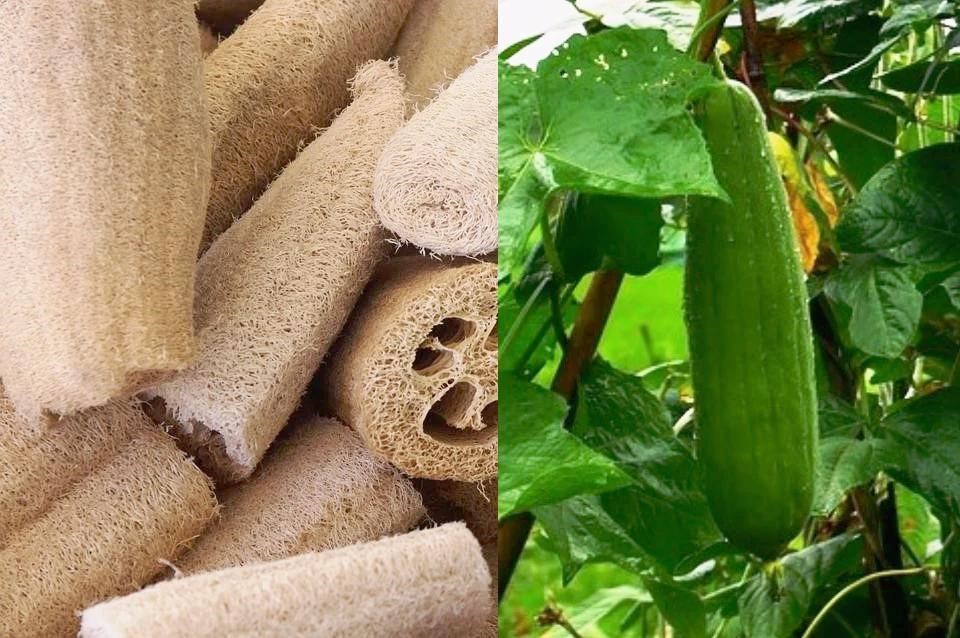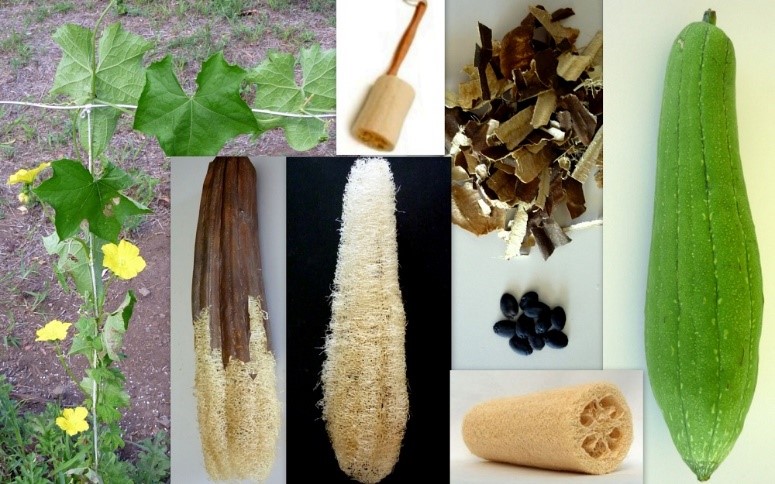Most of us are familiar with loofahs. Even if you didn’t carry these colorful bathroom products into adulthood, you likely remember them from your childhood. Whether you used one just yesterday or left them in your youth, we’re excited to share with you all the reasons why you should be using a loofah now.
But we don’t recommend just any old loofah; you need a natural loofah. Like most other bathroom and kitchen products, not all loofahs are created equally. And if you’re on a journey to make your home and lifestyle more eco-friendly, you’ll want to read on and discover a new way to scrub.
What is a Loofah?

First, let’s go through a quick breakdown of what a loofah is, for anyone unfamiliar. Loofahs are popular bath and shower accessories that are often used to apply soap or body wash to the body and face.
Hailed as skincare heroes, loofahs have other purposes that many people aren’t as familiar with. On top of being popular bathroom products, loofahs are also handy products for cleaning in the kitchen and other areas of the house.
How Are Traditional Loofahs Made?

Traditional loofahs are made of plastic and other colorful synthetic materials. These materials are gathered up into looped sections of mesh to form them into fluffy balls. As it turns out, the loofahs of our childhoods are not actually loofahs at all. Think of them as bath poufs instead.
These bath poufs are outdated and detrimental, with most of them getting tossed away after a short window of usability and then sitting in a landfill for hundreds of years or more. They often also end up in our oceans and other waterways, as they get dumped from the trash or leak microfibers from the plastic down the shower drain.
And to make matters worse, it appears that traditional loofahs can also be damaging to human health. When those microfibers sneak into your shower drain, they may enter local water sources. Some bath poufs are made with potentially cancer-causing ingredients, which we’re then rubbing on our bodies and drinking in our water. There must be a better way.
How Are Natural Loofahs Made?

Unlike spunky, vibrant bath poufs, natural loofah or natural loofah sponges are made with natural materials rather than plastics and other synthetics. For many years, a tropical plant called the Luffa aegyptiaca has produced fruit that is used to make natural loofahs.
Because of the plant’s texture and various uses, it’s often referred to as the sponge gourd or an Egyptian cucumber rather than its scientific name. These deep green plants are fibrous on the inside with a tubular pattern and a thick outer skin.
Natural loofahs are usually an off-white color, generally the true opposite of vibrantly colored bath poufs that are often mistaken for loofahs. In addition to being and looking more natural, these loofahs are also rougher than poufs, providing a better texture for exfoliating and cleaning.
Benefits of Using Natural Loofahs
There are many different benefits to choosing and using natural loofahs. We’ve covered quite a few of them already throughout the different sections in this article, but to make them easier to find, we’ve popped them all down here so they’re easy to find in one place.
Natural loofahs are:
- Made of natural ingredients and plant fibers rather than plastics and synthetics
- 100% compostable and biodegradable so they won’t end up in a landfill somewhere
- Ideal for exfoliating skin or scrubbing surfaces clean
- A natural solution to dry skin and rough spots
- Better for your body and the environment than traditional loofahs or bath poufs
- Affordable, sustainable, multifunctional, and effective
Our natural loofahs are cruelty-free, package and plastic-free, and made from 100% compostable and biodegradable ingredients like plant fibers, so they’re zero-waste in every sense of the phrase!
Ways to Use Loofahs in the Bathroom
The most common use for a loofah is for skincare in the shower. Because of its brittle texture, you can lather up a loofah and use it to clean and exfoliate your skin. Over time, dead skin cells naturally accumulate on the top layer of your skin, making it appear dull or flaky.
But not to worry, natural loofahs quickly and gently scrub this layer off without disrupting the healthier skin cells that lie underneath. You can also use natural loofah sponges to clean the sinks and tubs in your house. Their abrasive texture is not only ideal for skin polishing but for cleaning and scrubbing other surfaces, too.
Ways to Use Loofahs in the Kitchen
Natural loofah sponges can be used the same way traditional, plastic-containing sponges are used. Simply apply dish soap to the natural loofah and wash your dishes with it! You can also use it to scrub countertops, tabletops, and stovetops.
Wipe down the kitchen island with your natural loofah sponge, clean the sink, or make those fridge shelves look brand new again. Wherever you used to use a regular sponge, you can use a natural loofah sponge as an eco-friendly and cost-effective substitute.
We recommend changing out your loofah every four to six weeks, depending on how often you use it and how well it is holding up. Even natural products can harbor dirt and bacteria after a while. But unlike traditional plastic-based cleaning products, your natural loofah sponge is 100% compostable, so you can just bury it in the garden or compost it and watch it decompose within 30 days.
Why Natural Loofahs are Great Alternatives to Plastic Sponges
When comparing natural loofah sponges to traditional plastic sponges, the most notable difference is the materials used. For many people, the fact that natural loofahs are made with ingredients that are better for you and the environment is enough to warrant the switch.
But if you’re looking for additional reasons that natural loofahs are great alternatives to plastic sponges, we’ve got them!
Natural loofahs are also stronger and more abrasive than traditional sponges, making them better options for cleaning in the kitchen, bathroom, and other rooms in the house.
They’re easy to clean, can get added to your compost pile when you’re done, and these all-natural alternatives tend to last just as long, if not longer, than traditional sponges and loofahs or bath poufs. Right down to the shipping, our natural loofahs are 100% compostable, biodegradable, plastic-free, cruelty-free, and zero-waste. Whew, try saying that five times fast!
How to Keep Natural Loofahs Clean
Like regular kitchen sponges, our natural loofah sponges expand when you add water. This makes them use and easy to clean. To keep yours clean, rinse it out with soap and water after you’re done washing dishes or tidying up the kitchen, and put it somewhere clean to air dry.
In the bathroom, the conditions can be a bit trickier. Not only are you scrubbing dead skin cells into the mesh of the natural loofah, but the bathroom is also often the most warm and moist room in the house. These types of conditions are known to promote bacterial growth.
But don’t worry, cleaning and caring for your loofah can help you avoid any issues. Like you did in the kitchen, rinse your natural loofah out with soap and water after each use. Let it air dry. Since bathrooms are not ideal for air drying, you might need to open a window or turn on a fan.
You can also put it in another room to dry and make it last longer. Avoid putting it into a drawer or any other enclosed area that might keep it from drying out properly. Dermatologists suggest replacing your shower loofah every two to three months.
But if you notice a smell, mold starting to grow, or any kind of color change before then, it’s time to compost this one and start fresh. Use your best judgment when it comes to the life of your loofah. They have different shelf lives depending on how often you use them, how well you clean them, and whether or not they fully dry out between each use.
Safimex company is one of a largest Loofah farm in Vietnam. We’re supplying Natural loofah with a best price for small and bulk order. If you are interested in this product, please feel free to contact us at info@safimex.com or click at https://www.alibaba.com/product-detail/Natural-loofah-sponge-for-exfoliating-with_10000012272448.html?spm=a2747.manage.0.0.571d2c3ciKzmEw
Source: Eco roots
SAFIMEX JOINT STOCK COMPANY
Head Office: 216/20a Duong Ba Trac Street, Ward 2, District 8, Hochiminh City, Vietnam.
Tel: (+84)-(28)-3636 2388 | (+84)-(28)-3636 2399 | Website: https://safimex.com/
